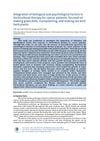
Modern hair restoration techniques can effectively treat hair loss and provide natural-looking results.
 January 2012 in “Elsevier eBooks”
January 2012 in “Elsevier eBooks” Hair loss can cause emotional and social issues, and various treatments, including medication, surgery, and psychological support, are needed.
 September 2004 in “Atlas of the Oral and Maxillofacial Surgery Clinics”
September 2004 in “Atlas of the Oral and Maxillofacial Surgery Clinics” Hair restoration surgery techniques can effectively treat scalp deformities and have evolved to provide natural-looking results.
 June 2002 in “Seminars in Cutaneous Medicine and Surgery”
June 2002 in “Seminars in Cutaneous Medicine and Surgery” Hair transplantation has improved to more natural-looking results and is complemented by effective non-surgical treatments, with ongoing research into hair follicle cloning.
 January 2001 in “Current problems in dermatology”
January 2001 in “Current problems in dermatology” Hair transplantation has improved to use smaller grafts for a natural look and may include follicle cloning in the future; non-surgical treatments are also effective.
 January 2007 in “Dermatologic Surgery”
January 2007 in “Dermatologic Surgery” Artificial hair fibers help treat scalp scars with few complications and a 20% yearly fiber fall rate.
 1 citations,
January 2016
1 citations,
January 2016 Learn how to do hair restoration surgery.
 March 2021 in “Hair transplant forum international”
March 2021 in “Hair transplant forum international” Minoxidil helps hair growth.
1 citations,
January 2010 in “Springer eBooks” Hair cloning could solve the problem of limited donor hair in transplants.

Surgical hair restoration can be done without hair transplantation.

Hair loss in women can be caused by genetics, menopause, certain health conditions, and emotional stress, and it often results in thinner hair and a changing hairline.
1 citations,
January 2010 in “Springer eBooks” 
Scalp flaps in hair restoration surgery provide immediate results, prevent temporal hair loss, offer great density, and allow for large hair re-allocation, making them a popular choice, especially in Asian countries.
 January 2010 in “Springer eBooks”
January 2010 in “Springer eBooks” Hair transplant works best in healthy individuals, and those with medical issues need extra care.
January 2010 in “Springer eBooks”  3 citations,
January 2019 in “Journal of Cutaneous and Aesthetic Surgery”
3 citations,
January 2019 in “Journal of Cutaneous and Aesthetic Surgery” Scalp and beard hair survive best in hair transplants, but the procedure needs high skill and takes longer.
 3 citations,
August 2017 in “PubMed”
3 citations,
August 2017 in “PubMed” A man got a scalp infection from synthetic hair implants because the procedure wasn't done by a doctor and was poorly managed.
2 citations,
January 2022 in “Springer eBooks”  1 citations,
January 2010
1 citations,
January 2010 Asian women experiencing hair loss often feel embarrassed and unhappy, but hair transplantation can offer natural-looking results and improve their self-confidence.
May 2023 in “Experimental Dermatology” Male pattern hair loss may be linked to the developmental origins of hair follicles.
 September 2018 in “Research in medical & engineering sciences”
September 2018 in “Research in medical & engineering sciences” The author was scammed by a marketing company and discussed a man scammed by a clinic that provided poor hair transplants, leading to bad results and scarring.
January 2023 in “Springer eBooks”  January 2022 in “Springer eBooks”
January 2022 in “Springer eBooks” The book explains causes and treatments for common hair loss, its psychological effects, related health risks, and emphasizes early screening and lifestyle changes.
 November 2005 in “Journal of Investigative Dermatology Symposium Proceedings”
November 2005 in “Journal of Investigative Dermatology Symposium Proceedings” The 2004 hair research meeting presented new findings on hair cell differentiation, genetic factors in hair loss, hair pigmentation, and potential targeted therapies.
 13 citations,
August 2018 in “Journal of Molecular and Cellular Cardiology”
13 citations,
August 2018 in “Journal of Molecular and Cellular Cardiology” Finasteride improves heart function and repairs damage after heart attack in mice.
 November 2018 in “Journal of Molecular and Cellular Cardiology”
November 2018 in “Journal of Molecular and Cellular Cardiology” Finasteride improves heart function and repairs damage after heart attack in mice.
 45 citations,
December 1991 in “Annals of the New York Academy of Sciences”
45 citations,
December 1991 in “Annals of the New York Academy of Sciences” ECM molecules are crucial for hair growth and development.
 21 citations,
February 2015 in “Journal of Feline Medicine and Surgery”
21 citations,
February 2015 in “Journal of Feline Medicine and Surgery” Negative pressure wound therapy is effective for skin grafts in cats.
 July 2019 in “Acta horticulturae”
July 2019 in “Acta horticulturae” Horticultural therapy helped cancer patients feel hopeful and positive about their disease experience.























